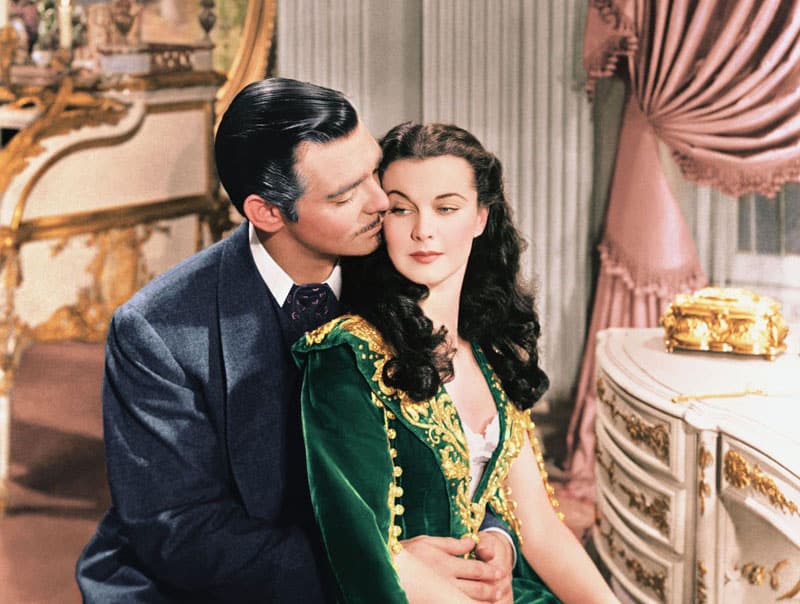
It is considered to be the most enduring film of all time. It was based on Margaret Mitchell’s only novel. It was Gone with the Wind and this year marks the 80th anniversary.
Released on Jan. 17, 1940, and spanning 234 minutes (with an overture, intermission, entr’acte and exit music), everything from the script, the costumes and the score to the depiction of historical events, the leads and the controversies both on and off set, have all contributed to the iconic historical romance. Set in the American South against the backdrop of the American Civil War and the Reconstruction era, Gone with the Wind tells the story of Scarlett O’Hara, the strong-willed daughter of a Georgia plantation owner, who spends her days at Tara in the romantic pursuit of Ashley Wilkes, who is married to his cousin, Melanie Hamilton. The film sees Scarlett’s rise and fall from grace both as a woman, a human and eventually, a business owner, after the Civil War leaves her beloved plantation of Tara in ruins. Having been left with absolutely nothing and in regaining her wealth and building up her reputation, Scarlett becomes a smart business woman and subsequently marries the charming Rhett Butler, a major turning point in her life and the second half of the film.
Smashing records for the most successful film in box office history at the time and long after, the film was famously one of the first to use the word “damn.” Rhett Butler’s unforgettable last words to Scarlett have the lead saying “Frankly, my dear, I don’t give a damn,” in regards to the dissolution of their marriage and where Scarlett will go. The word was previously prohibited by the 1930 Motion Picture Production Code, which was later ratified.
At the 12th Academy Awards, Gone with the Wind set a record for Academy Award wins and nominations, winning in eight of the 13 categories it was nominated in, including Best Picture, Best Actress, Best Supporting Actress, Best Director, Best Screenplay, Best Cinematography, Best Art Direction and Best Editing.
In another award milestone, screenwriter Sidney Howard became the first posthumous Oscar winner and producer David O. Selznick received the Irving G. Thalberg Memorial Award for his career achievements.
Without Ashley’s mere existence as a romantic interest propelling so many motives; Melanie’s unwavering loyalty and generous capacity for kindness and forgiveness; Rhett Butler’s charm, wealth and no-nonsense attitude and, of course, Scarlett O’Hara’s resolute demeanor, conniving mind and insatiable quest for love, Gone with the Wind would have just been another Civil War-era novel.
The Core Four
The studio at MGM landed on four principle leads: Clark Gable as Rhett Butler; Leslie Howard as Ashley Wilkes; Olivia de Havilland as sweet Melanie Hamilton Wilkes and Vivien Leigh as Katie Scarlett O’Hara. It is said that producer David O. Selznick wanted Gable for the role from the very beginning. When casting the role for Scarlett, 31 women were screen tested, which ultimately went to Leigh, an English actress who was little known in America. In the end, the beautiful, privileged and pouty Southern belle from Georgia became a career-defining role for Leigh, earning her the award for Best Actress.
Romanticizing Marital Rape?
What many see as lust and passion, others feel is a romanticized depiction of marital rape. The scene in question refers to an argument that happens between Rhett and Scarlett. His attempts to kiss her at the bottom of a staircase begin to mount with her protesting “no,” and climaxing with a drunken Rhett carrying a still protesting Scarlett up the stairs to the bedroom. In the next scene, Scarlett awakens with a glow about her after the evening’s events, with Rhett apologizing for his actions. According to feminist film critic and author Molly Haskel, the scene was largely uncriticized by women, with Haskell stating that “by and large, it is consistent with what women have in mind if they fantasize about being raped. Their fantasies revolve around love and romance rather than forced sex.” Aside from the fact that this film never would have been made today, the Time’s Up and Me Too movement would have squashed any chance of this moment happening, among many others that seem to rightfully so, put Scarlett in her place, whether by a man or other emotional circumstance throughout the film.

Racial Criticism
Having taken place during the Civil War, there was only so much the book and the film could do to not make the entirety of Gone with the Wind too far from the times. While many support both the book and the film as simply following the times, others accuse it of racial criticism, extending the views on Civil War myths and black stereotypes. British historian David Reynolds wrote that “The white women are elegant, their menfolk noble or at least dashing. And, in the background, the black slaves are mostly dutiful and content, clearly incapable of an independent existence.” Gone with the Wind was criticized as a social propaganda film that offered a white supremacist view of the past, defending the traditional values of the middle and upper class while the issue of slavery is blatantly ignored. The racism even continued post-production and into Oscar season, when Hattie McDaniel in her role of Mammy, became the first African-American to win an Academy Award, beating out costar Olivia de Havilland (Melanie “Melly” Hamilton) who was also nominated in the same category. Unfortunately, McDaniel and her escort were segregated from the rest of the cast, and were seated at a separate table in the back of the room.
In today’s overly sensitive world, there is no longer an understanding of period films and novels, especially for those that depict more trying and troubling times of racism, rape, starvation, death, crime and financial woes. Just as 2011’s cries called for the censorship of the N-word in Mark Twain’s American classic The Adventures of Huckleberry Finn, in 2017, Gone with the Wind was pulled from Memphis, Tennessee’s Orpheum Theatre after a 34-year annual run due to its perceived racially insensitive content.
In Popular Culture
The show that draws from seemingly every current and cultural event, The Simpsons spent several episodes borrowing classic lines from the iconic film. In one scene Bart Simpson vows: “As God is my witness, I can pass the fourth grade!” mimicking Scarlett O’Hara’s famous proclamation, “As God is my witness, I will never be hungry again!”
And who can forget Carol Burnett’s laugh out loud “Went With The Wind” sketch from The Carol Burnett Show when she parodies Scarlett O’Hara as Starlet O’Hara. Burnett famously sauntered down a staircase draped in an actual curtain rod and green curtains, later dubbed “The Curtain Dress.” The scene elicited a 10-minute laugh sequence from the audience and made its moment in history as one of the funniest television moments of all time. The dress, including the curtain, is on display at the Smithsonian Institution.
If you find yourself with four hours to spare, acquaint yourself with the epitome of film during Hollywood’s Golden Age. After all, tomorrow is another day.
































